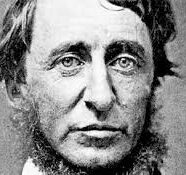Henry David Thoreau’s “On the Duty of Civil Disobedience.”
p. 226: “We are accustomed to say, that the mass of men are unprepared; but improvement is slow, because the few are not materially wiser or better than the many. It is not so important that many should be as good as you, as that there should be absolute goodness somewhere; for that will leaven the whole lump. There are thousands who are in opinion opposed to slavery and to the war, who yet in effect do nothing to put an end to them; who, esteeming themselves children of Washington and Franklin, sit down with their hands in their pockets, and say that they know not what to do, and do nothing; who even postpone the question of freedom to the question of free-trade, and quietly read the prices-current along with the latest advices from Mexico, after dinner, and, it may be, fall asleep over them both.” Isn’t this an earlier version of Yeats’ “Romantic Ireland’s dead and gone/ It’s with O’Leary in the grave.”? Does it not echo Rodney Crowell: “Democracy won’t work if we’re asleep.”?
Voting is exposed here for what it is, a cop-out, something we do so as we don’t feel bad about not doing more: “At most they give a cheap vote, and a feeble countenance and Godspeed, to the right as it goes by them. There are nine hundred and ninety-nine patrons of virtue to one virtuous man; but it is easier to deal with the real possessor of a thing than with the temporary custodian of it.” If we were all virtuous men and women, the vote would be, at most, the beginning of our involvement in politics; as it is, it’s our stopping point.
Thoreau asks why we feel the need to elect a man to office before we wish to avail of the wisdom he may have to offer? He finds that the “respectable” man despairs of his country when his country should be despairing of him; that same man is an “Old Fellow”, a man without “intellect and cheerful self-reliance”, who, from birth onwards, is concerned with ensuring that “the alms-houses are in good repair” and care for orphans and widows. There are men, he says, who’d like to be conscripted to quell the slaves’ uprising or fight the Mexicans, just so they could refuse; but, nevertheless, the same man, by his allegiance to the State in other ways connected with money, effectively sends a substitute in his place while thanking himself for his empty protest. The least a man can do, short of actively opposing a wrong, is to wash his hands of it; if he’s to go his own way in life, then go on his own feet and not on another’s shoulders.
In reading Thoreau, it is difficult to resist the impression that men almost everywhere are cowardly. But what is it to be a hero? Heroism must involve real fear of loss – either of your life or your possessions or both. Cowardice therefore might be well enough defined as perceiving a wrong and paying lip service to it, complaining about it but doing, well, nothing really.
R.H.






